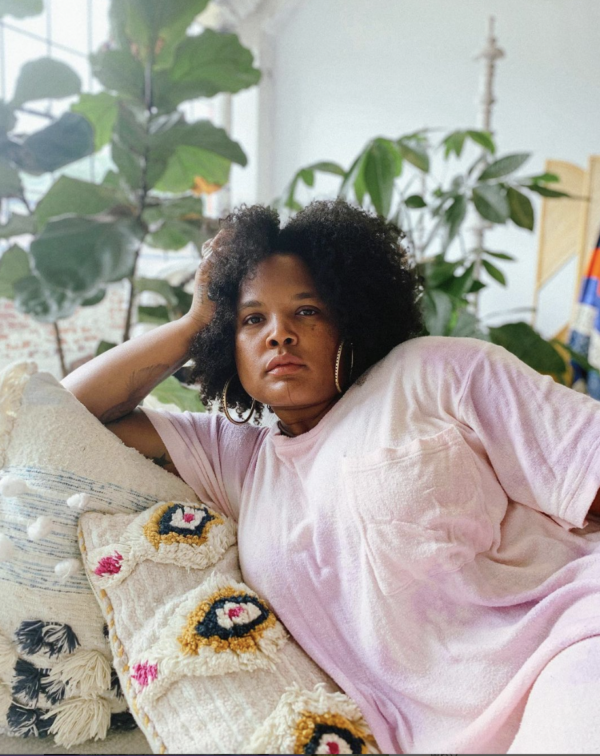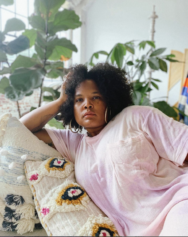In 2022, when Beatrice Dixon, the founder of the popular feminine hygiene brand The Honey Pot, changed the formula of her products it caused an uproar on social media and included accusations that Dixon had sold — or was attempting to sell — the company. Now comes the news she has just sold the company to public investment fund Compass Diversified.

The Wall Street Journal reported on Jan. 16 that Compass acquired Honey Pot for $380 million, with the acquisition expected to close in February.
The Black-owned, plant-based brand was created by Dixon in 2012 and headquartered in Atlanta with the purpose of providing a healthy alternative to hygiene, menstrual, and sexual wellness products on the market.
Dixon was inspired to found The Honey Pot by a personal need. She couldn’t find a suitable remedy for bacterial vaginosis. So in 2012, with a $21,000 loan she went to work in her apartment kitchen on making more holistic feminine products. The Honey Pot Company introduced its natural wash at the Bronner Brothers hair show in 2014 in Atlanta, selling 600 bottles that treated bacterial vaginosis in a single weekend.
“I created Honey Pot back in 2012 after dealing with eight months of a recurring bacterial vaginosis infection I did it all, the antibiotics, the doctors’ visits and nothing was working. I tried everything you can think of both over the counter and home remedies and I kept finding myself back where I started,” Dixon said in 2021 interview with The Verticale.
“One night I had a dream with an ancestor and she gave me a list of ingredients,” she continued.” I woke up and made the formula that she gave me in my dream. I used the wash and within days my symptoms had disappeared. I knew I wasn’t the only woman dealing with BV and other vaginal issues so that was how The Honey Pot Company was born.”
Her success continued as, within a year, she secured placement on the shelves of her local Whole Foods. Target buyers soon reached out, leading to a meeting that further propelled the brand’s growth.
Today, The Honey Pot products are available in over 33,000 U.S. stores, including Target, Walmart, CVS, and Walgreens. Its strong online presence, particularly through viral marketing on Instagram, directs users to its website, creating a solid connection between the hygiene provider and its customer base.
According to its website, Honey Pot sells a range of women’s wellness products beyond wash wipes. The brand provides consumers with pills, wash foams, cotton liners, panty sprays, as well as adult intimacy products, itching relief products, and even bath bombs.
“We are excited to embark on this partnership with CODI, a firm that aligns seamlessly with our values and is dedicated to championing our vision of destigmatizing feminine care through accessible products and promoting holistic wellness, both inside and out,” Dixon said in a press release.
Dixon will retain her roles as CEO and Chief Innovation Officer, working alongside the original 15-person leadership team and existing owners, who will maintain a their minority stake in the company, Inc. reported.
The global feminine hygiene products market is expected to experience growth, projected to increase from $41.29 billion in 2023 to $62.66 billion by 2030, with a compound annual growth rate (CAGR) of 6.1 percent, according to Fortune Business Insight.
Flashback to 2022
In May 2022 Dixon addressed criticism regarding the ingredient change in and packaging of her vegan-friendly wipes. In her Instagram statement, Dixon reiterated her commitment to the formula change, emphasizing its clinical testing and consumer surveys.
Despite perceptions that the ingredient change and new look signaled a move towards being sold, Dixon disputed those claims. Dedicated consumers have assumed that Dixon was preparing to sell the company.
“We have not sold. We are the same brand that you lifted up and fought for two years ago,” Dixon said. “Honey Pot is a human-owned brand. I designed a brand and a product line that is revolutionary and owned by me, my brother, and our team. To negate the disruption this brand has created is to undermine everything our community, this brand, and I have achieved together.”
It was also in 2022 that Forbes reported Dixon as one of the first 40 women of color to raise $1 million in venture capital, a milestone, considering startups led by Black women receive less than one percent of venture capital funding.
Was There Always An Exit Plan?
Even before the 2022 social media brouhaha, there had been talk of an “exit plan” devised by Dixon. In an 2020 interview with The Helm, she spoke about life after The Honey Pot.
Dixon said, “I absolutely do want to exit my company and I’m so vocal about that because culturally as a Black woman, getting investment dollars or exiting your company can be looked at as selling out, and what I want to regurgitate constantly to anybody, to any human that’s looking to The Honey Pot Company as a light, I want to be public that there’s no shame in exiting your business because that’s how you’re going to get to wealth.”
She added, “Once you can get to wealth financially, you’re able to really contribute to your community, to your family, to yourself. You’re able to see the fruits of your f–king labor.”
Reactions to Sell
While some applauded Dixon’s choice to capitalize on her brand, certain users, especially Black women, expressed disappointment. They felt betrayed, as Dixon had previously denied discussions of selling out.
“Wasn’t this the woman that was rallying up Black ppl to support her business because the white ppl were boycotting it?” one user wrote.
“This is terrible I’m tired of our ppl selling they shit to those ppl SMH,“ another said.
“Sales are about to plummet. The product isn’t going to be the same anymore,” one user said.
“Great for her, bad for customer,“ another user posted.
Time will tell if The Honey Pot’s loyal customers will remain with the brand now that it has changed hands.



Loved your products. I don’t buy products once they change hands from the Black creator and sold to a new entity. History shows that once the business is sold the original products are no longer the same.
Your story had me up to the point where you said – you’re able to see your f—king labor”. You are so disrespectful to your own – who supported you with no hesitation. As an older woman I used your products during a tough time until I could get a doctors appointment. It worked but required additional meds.
Young Lady, I wish you the best and I pray, that your love of financial wealth serves you and your family well. You lost one customer.
And if it changes hopefully another fine black product will fill the void. capitalism At work. She had good product, marketed it well and advanced its worth and sold it for a profit. I dont see the problem.
I love your product. I didn’t like that your liners changed;come only now as covers..very wide..I have to cut to fit. We all don’t wear wide crotch panties. I was buying the regular daily liners, then they no longer existed. I pray your products formula do not change as many other black owned companies did once sold to Whites. Never the same affect. Which is sad.